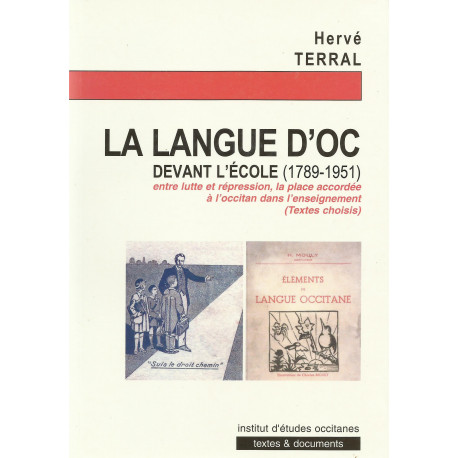Recently added item(s)
No products
Product successfully added to your shopping cart
There are 0 items in your cart. There is 1 item in your cart.
Histoire - Etudes
- New Selection
- Books
- Music
- Videos - DVD
- Miscellaneous
- Revues, Journaux
Links
La langue d'oc devant l'école (1789-1951) - Hervé Terral
L-9782859103835
New
This product is no longer in stock
25,00 €
La langue d'oc devant l'école (1789-1951) entre lutte et répression, la place accordée à l'occitan dans l'enseignement (Selected texts) - Hervé Terral. Commented anthology of texts tracing the debates in France on the place of regional languages and in particular Occitan in schools, from the French Revolution to the vote on the Deixonne law in 1951. Textes & documents, IEO edicions.
Data sheet
| Type | Paperback |
| Year | 2005 |
| Language | French |
| Pages | 350 |
| Format | 16 x 22,5 cm |
| Distributor | IEO edicions - IDECO |
| Label | Collection Textes & documents |
| ISBN | 978-2-85910-383-5 |
More info
La langue d'oc devant l'école (1789-1951) - Hervé Terral
entre lutte et répression, la place accordée à l'occitan dans l'enseignement (Textes choisis).
Between struggle and repression, the place of Occitan in education (Selected texts).
Commented anthology of texts tracing the debates in France on the place of regional languages and in particular Occitan in schools, from the French Revolution to the Deixonne law of 1951.
From the French Revolution to the Deixonne law (1951): here's an anthology of texts tracing the incessant battle waged at institutional level for or against the presence of regional languages in schools. You'll find the famous pleas of Mistral, Jaurès, Perbosc and Mouly, the surprising positions taken by Charles Nodier and Charles de Gaulle (the General's uncle), the enlightened proposals of Savinien, as well as murderous inspection reports, ambiguous statements by politicians and more... Two centuries of constant struggle to gain recognition for France's rich linguistic heritage. A battle which, even today, is far from won.
The long historical path that leads from the idea of "tolerance", yesterday primarily religious, to the contemporary affirmation of genuine "cultural rights", through the early texts of the debate on the place of the langue d'oc in schools.
Preface by Robert Lafont.
Collection Textes & documents, IEO edicions.
The author:
Hervé Terral was born in Versailles in 1950, to a father from Béziers and a mother from Nîmes. He is currently Professor of Sociology at Toulouse-le-Mirail University. He previously worked as a teacher of psychopedagogy and philosophy in teacher training colleges and IUFMs. His research focuses on vocational education, teacher training and citizenship - the latter opening up the question of the "languages of France". Books published by PUF, L'Harmattan, CNDP, INRP...
Summary:
Instruction publique et francisation linguistique, p. 67.
P. Bernadau, Lous dreitz de l’ome (10 septembre 1790), p. 69.
G. Lavabre, La Garisou de Mariano (oct. 1792), p. 74.
Baron Trouvé, Description de l’Aude (1818), p. 78.
F. Pariset, L’instruction en Lauraguais (1867), p. 85
Rapport d’inspection (Tarn, 1856), p. 92.
Comité d’Instruction Publique de Cahors, interdiction du patois, p. 97.
Ch. Nodier, Conte fantastique (1834), p. 99.
Dupleich, Préface (Dictionnaire patois/français), 1834, p. 106.
Combats politiques : la République une ou plurielle ? p. 111.
Pétition pour les langues provinciales (1870), p. 116.
Michel Bréal, L’enseignement du français et le patois (1878), p. 129.
M. Bréal, Discours à la fête des félibres (1890), p. 133.
P. Passy, Lettre à P-D. Lafore (1903), p. 136.
G. Tarde, Lettre aux instituteurs (1899), p. 138.
F. Mistral; Discours de 1875 à Montpellier, p. 140.
F. Mistral, Lou Prouvençau dins lis escolo (1898), p. 145.
A.Sourreil, A la ligue de l’Enseignement (1899), p. 147.
F. Pécaut, Textes sur les patois (1889-1905), 150.
J. Jaurès, Textes sur les patois(1909-1911), p. 158.
Pratiques scolaires , p. 169.
F. Mistral, Lou signe (1894), p. 175.
D. Terrade, le Sinhal (1929), p. 178.
S. Lacoste, Origine des dialectes locaux (1902), p. 180.
S. Lacoste, 2e ex. de leçons( Manuel du maître) p. 183.
J. Tournié, L’idiome d’Arnaud-Guilhem (1886), p. 188.
Mme Gelado, institutrice à Carbone (1896), p. 194.
J. Roundou, Proverbes de Barèges (1914), p. 196.
A. Perbosc, Contes populaires (1914), p. 200.
A. Perbosc, Le fin valet/ le fi ballet (1914), p. 210.
E. Petit, L’école et la « petite patrie » (1901), p. 214.
Villeneuve-Savinien, Enquête sur l’Oc (1911) p.219..
« Vingt fois sur le métier », p. 247.
Ligue pour la langue d’oc à l’Ecole (1924), p. 253.
Anatole de Monzie, circulaire du 14 août 1925, p. 255.
Lettre à un Barde (1927), p. 259.
G. Balagayerie, Le patois à l’école (1925), p. 264.
P. Lhande, Les parlers régionaux (1925), p. 266.
A. Perbosc, Les langues de France à l’école (1926), p. 268.
Ph. Pétain, Mistral et la renaissance provençale (1942) p. 284.
G. Ripert, documents pour l’enseignement (1940) p. 285.
La langue d’oc à l’école (1941-1942),p. 287.
E. Mouly, l’oc à l’escòla (1942)., p. 292.
Calelhou, L’oc dans la formation des maîtres (1942) p. 308.
Discours de Jean Cassou (1945), p. 318.
E. Cabanas, D’un ensenhament regionalista (1946), p. 321.
C. Freinet, Lettre du 30 octobre 1947, p. 327.
Loi Deixonne, (1951), p. 331.
Conclusion, Per jòia recomençar (1951), p. 3
Reviews
No customer comments for the moment.
 English
English Français
Français Occitan
Occitan






